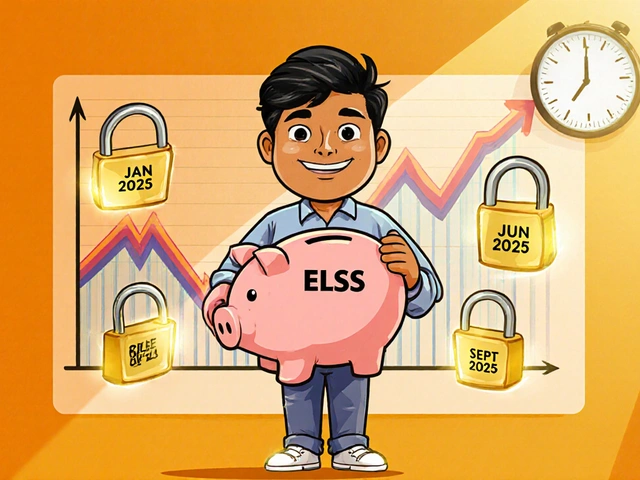Dividend Distribution in India: Record Date, Ex-Date, and Payout Timeline Explained
If you own shares in an Indian company, you’ve probably seen a dividend announcement and wondered: When do I actually get the money? It’s not as simple as just waiting for the company to say "we’re paying dividends." There’s a sequence of dates that determines who gets paid, when they get paid, and what you need to do to make sure you’re on the list. Skip the confusion-here’s exactly how dividend distribution works in India, step by step.
What Happens When a Company Decides to Pay Dividends?
When a company earns profit, the board of directors decides whether to reinvest it back into the business or share it with shareholders. If they choose dividends, they announce it publicly. But that announcement is just the starting point. The real clock starts ticking with three key dates: the declaration date, the record date, and the ex-date. The payout date is the final step.
Let’s say you bought shares of Infosys on Monday. You see the dividend announcement on Tuesday. Does that mean you’ll get the dividend? Not necessarily. You need to know the record date. If you bought the shares after the record date, you won’t get paid-even if you owned them when the dividend was announced. This trips up a lot of new investors.
The Record Date: Who Gets Paid?
The record date is the cutoff. It’s the day the company looks at its shareholder register to see who owns the stock. Only people listed as owners on that day get the dividend. It’s not about when you bought it, or when you plan to sell it-it’s about who’s on the books at midnight on that date.
In India, the record date is usually set 2-4 business days after the ex-date. Why? Because of how stock settlements work. When you buy shares, it takes two business days (T+2) for the trade to settle and your name to appear in the company’s register. So if the record date is on a Thursday, you must have bought the shares by the close of trading on the Monday before that. If you buy on Tuesday, the trade settles on Thursday-but the record date has already passed. You miss out.
Companies in India follow SEBI guidelines. They must announce the record date at least 7 days before it occurs. You’ll find this in the company’s official公告 (notice) on BSE or NSE, or in their investor relations section.
The Ex-Date: The Last Day to Buy for the Dividend
The ex-dividend date (or ex-date) is the most important date for traders. It’s the first day the stock trades without the dividend attached. If you buy on or after the ex-date, you won’t get the dividend. The seller does.
Here’s how it works: in India, the ex-date is set one business day before the record date. So if the record date is Friday, the ex-date is Thursday. That means if you buy shares on Thursday, your trade settles on Monday-but the record date was Friday. You’re not on the list. You bought too late.
On the ex-date, the stock price typically drops by the amount of the dividend. Why? Because the company’s value decreases by the cash it’s about to pay out. If a stock is trading at ₹1,000 and pays a ₹20 dividend, it will likely open at ₹980 on the ex-date. That’s not a loss-it’s just a transfer of value from the stock price to your bank account.
Many traders try to buy just before the ex-date and sell right after, hoping to pocket the dividend. But this strategy rarely works after accounting for taxes, brokerage fees, and price movement. It’s not free money-it’s a timing game with risks.

Payout Timeline: When Does the Money Hit Your Account?
After the record date, the company sends the dividend amount to the National Securities Depository Limited (NSDL) or Central Depository Services (India) Limited (CDSL). From there, it flows into your demat account linked to your bank. This takes time.
In India, the dividend payout date is usually 15-30 days after the record date. Most companies aim for 20-25 days. For example, if the record date is June 10, you’ll likely see the dividend in your bank account by July 5-10. Some companies, especially large ones like Reliance or HDFC Bank, pay faster-sometimes within 10-12 days.
Don’t expect an email or SMS every time. The dividend appears as a credit in your demat account under "Corporate Actions." Check your broker’s app or website under "Portfolio" or "Holdings." You’ll see the dividend amount, the company name, and the date it was credited.
Some investors get confused because they see the dividend in their demat account but not in their bank. That’s normal. The money moves from demat to bank automatically, but it can take an extra 1-2 days. If it’s been more than 30 days and you haven’t received it, contact your broker or check the company’s investor relations page for the payout status.
How Dividend Tax Works in India (2025)
Dividends are no longer tax-free in the hands of shareholders. Since April 1, 2020, companies pay a Dividend Distribution Tax (DDT), but that was abolished. Now, dividends are taxed in your hands under "Income from Other Sources."
If your total dividend income from all sources exceeds ₹5,000 in a financial year, the company will deduct 10% TDS (Tax Deducted at Source). You don’t need to pay extra if your total income falls under the basic exemption limit. But if you’re in the 30% tax bracket, you’ll owe the difference when you file your ITR.
For example: You receive ₹8,000 in dividends from five different companies. The company deducts ₹800 as TDS. When you file your return, you report ₹8,000 as income. If you’re in the 20% tax bracket, you owe ₹1,600 total. You’ve already paid ₹800, so you pay ₹800 more. If you’re in the 5% bracket, you get a refund of ₹300.
Keep track of your dividend income. Use your Form 26AS to see how much TDS was deducted. Don’t assume it’s all covered.
What If You Sell Before the Payout Date?
Here’s a common mistake: You buy shares before the ex-date, hold through the record date, and then sell before the payout date. Do you still get the dividend?
Yes. Once you’re on the record date list, the dividend is yours-even if you sell the shares the next day. The payout goes to whoever owned the shares on the record date, regardless of who holds them later. The buyer of your shares won’t get the dividend-you will.
But remember: the stock price drops on the ex-date. If you sell right after, you might not make a profit. The dividend isn’t extra cash-it’s part of the stock’s value being redistributed.
How to Track Dividend Dates
You don’t need to guess. Use these tools:
- BSE India and NSE India websites: Go to the company’s page under "Corporate Actions"
- Moneycontrol or Investing.com: Search for the stock, then check the "Dividends" tab
- Your broker’s app: Most have a dividend calendar under "Research" or "Markets"
- Company investor relations page: Always the most reliable source
Set calendar reminders for the ex-date and record date. Missing one means missing the dividend. It’s that simple.
Common Mistakes Investors Make
- Buying on the ex-date thinking they’ll get the dividend
- Assuming dividend payout happens immediately after the record date
- Ignoring TDS and forgetting to report dividend income in ITR
- Selling right after the payout date and thinking they "made" the dividend profit
- Not checking the dividend amount per share-some companies pay in scrips, not cash
One investor I know bought 100 shares of a dividend-paying stock just before the ex-date. He was excited to see ₹1,500 credited. But he didn’t realize the stock had dropped ₹15 per share. His net position hadn’t changed. He thought he’d made money. He hadn’t.
Final Tip: Dividends Are Part of the Picture
Dividends feel like free money, but they’re not. They’re a portion of the company’s value being returned to you. A high dividend yield doesn’t mean a good stock. If a company is paying out too much, it might not be reinvesting enough to grow. Look at the payout ratio-what percentage of profits are being paid out? Above 80%? That’s risky. Below 40%? That’s sustainable.
Dividends are great for passive income. But they’re not a shortcut to wealth. Understand the dates. Track the timeline. Know the tax rules. And always, always check the company’s official announcements-not just what you read on social media.
What happens if I buy shares on the record date?
If you buy shares on the record date, you will not receive the dividend. In India, trades settle in T+2 days. So if the record date is Friday, you must buy by the close of trading on the previous Monday. Buying on Friday means your trade settles on Tuesday-after the record date has passed.
Is the ex-date the same as the record date?
No. The ex-date is always one business day before the record date. The ex-date is when the stock starts trading without the dividend. The record date is when the company checks its shareholder list. You must own shares before the ex-date to be eligible for the dividend.
How long does it take for dividends to be credited to my account?
In India, dividends are usually credited to your demat account 15 to 30 days after the record date. Most companies take 20-25 days. The money moves from the company to NSDL/CDSL, then to your bank. Check your broker’s app under "Corporate Actions" for the exact credit date.
Do I pay tax on dividends even if I didn’t sell the shares?
Yes. Dividends are taxable in your hands regardless of whether you sold the shares. If your total dividend income exceeds ₹5,000 in a financial year, the company deducts 10% TDS. You must report this income in your ITR under "Income from Other Sources," even if you didn’t sell.
Can I get dividends if I hold shares in physical form?
Yes, but it’s slower and more complicated. Companies used to send dividend cheques to registered addresses. Now, most require demat accounts. If you hold physical shares, contact the company’s registrar (like KFin Technologies or CAMS) to update your details. You’ll need to dematerialize your shares to get timely payouts.





